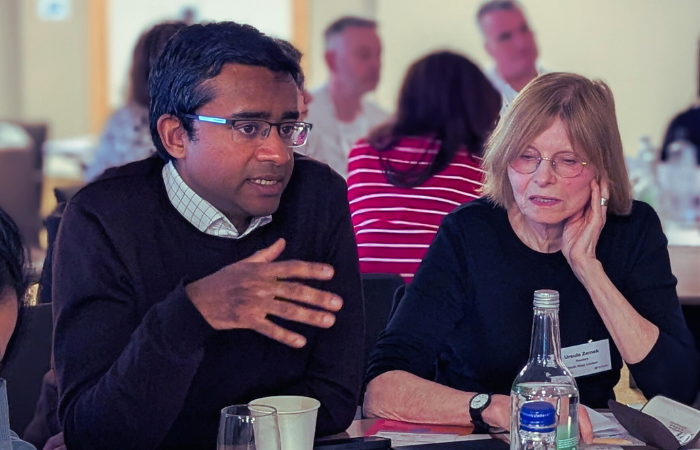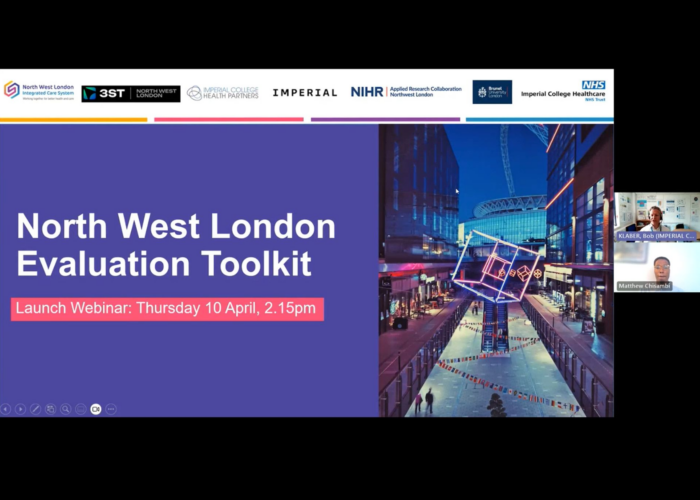 We look at ICHP’s role in providing health economics workshops for healthcare innovators in the Imperial College-led MedTech SuperConnector programme.
We look at ICHP’s role in providing health economics workshops for healthcare innovators in the Imperial College-led MedTech SuperConnector programme.
MedTech SuperConnector (MTSC), launched in 2018, is an accelerator initiative from a consortium of eight London universities – led by Imperial College – that provides funding and expertise to facilitate the transformation of medical technology innovations into clinical solutions for the NHS.
The accelerator programme has been custom designed to encourage individuals to bring forward ideas for devices, diagnostics, and digital healthcare solutions, that would otherwise not have support, so that they can have a positive impact on the healthcare system.
The MTSC partners aim to bring together established professionals from every sector with no major experience in healthcare innovation, or who might have a valuable idea but need expert input to bring it into reality. The projects can be in various stages of development depending on the cohort – some still in the lab, some at clinical trial stage, and some of them are further down the line. But all projects could benefit from expert advice and support on how to progress.
Each cohort of ten project leads is selected from a panel of consortium members to receive six months of expert help in developing their ideas further. A £50,000 grant (funded by Research England) is also given to each lead to help them make their project group’s idea a reality. These grants can be used however they are needed for each group’s goals such as hiring analysts, purchasing time with an evaluation machine, or running a clinical trial, depending on what stage each group is at.
Over the six months, the groups attend up to 30 workshops – around one each week – presented by experts in all different fields including AI, robotics, medicine, pharmacy, music, cellular biology, and economics. These workshops are designed to equip each cohort with a working background in the relevant fields to provide them with insight and direction on how to move ahead with their projects.
Last summer, my colleague Ralphael Oghagbon and I were asked to contribute to the curriculum by sharing ICHP’s expertise in health economics with the second MTSC cohort and, following feedback we provided, I was pleased to be invited to join the interview panel to pick the third cohort and help contribute to the updated programme. We worked with the curriculum team to update the programme’s structure by providing feedback on our experience and helped to develop an introductory boot camp concept.
The workshops
The boot camp was designed as a one-day session to give the incoming cohort an overview of what they could expect from all the workshops over the following six months. Each presenter gave a quick run through of their area of expertise and provided information for the groups to take away and digest. This gave them a chance to understand the basic structure of each field and for presenters to highlight time-critical or essential elements that could have repercussions later in the programme. The cohort also had the opportunity share their goals with the presenters to allow them to tailor their future sessions towards the cohort’s needs.
In January, we presented our health economics workshop to the cohort. The cohort was a mix of students and professionals who were working on projects outside of their ‘day jobs’ to bring efficiencies to the medical system, provide more cost-effective and improved products, and to ultimately improve patient care
The groups were working on a range of innovations from pharmaceuticals to devices to apps, and each benefitted from bespoke health economic expertise that matched their project’s specific needs. For example, one group had created a device that was ready for clinical trials, but they needed to show that it was cost effective as well as clinically effective, and another group needed to understand how best to market their projects.
Based on my involvement in selecting the cohort and our initial impressions with the individuals at the boot camp, we were able to tailor the workshop presentation and activities to be best suited for each project’s stage in development and the group’s experience or understanding of health economics.
Initially, we presented a short overview of health economics including how to develop an evaluation framework, structure research design and gather evidence for an economic evaluation. Multiple interactions and contact points allowed us to provide the groups with tailored advice and guidance as they moved forward with their projects. We also provided a pack of comprehensive information slides and resources on health economics to give the groups as many tools to take away as possible.
By sharing our skills and knowledge, we helped the groups apply health economics to their projects when they may not have previously considered it. Having a good start in the field and becoming familiar with the basic principles is essential for entrepreneurs starting out. Early entrepreneurial adoption of health economic factors helps prevent unanticipated friction later in the project and helps innovators keep their projects marketable.
We had a great response to the workshop, with all groups saying they thought health economics was very important for their project and even asking for more support such as individual one-on-one sessions.
The future
We are delighted to work with the MTSC to help innovators bring their ideas forward, drive innovation into the system to have a positive impact and share how to demonstrate that through health economic analysis. We are pleased to be able to share ICHP’s expertise in health economics – in fact, we’re also working on a project with an innovator from another London accelerator programme.
Health economics modelling is a complex art that our experts can make simple for others. We hope to offer this service more in the future, so we can give more groups the opportunity to benefit from the expertise at ICHP and get their project on the right footing as early as possible.
By Heather Humphreys, Health Analyst and Economist



